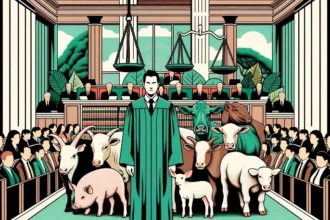Bridging Politics and Animal Rights
The intersection of animal rights with political agendas has traditionally been a minefield for candidates in the U.S. political arena. Recent studies challenge the prevailing notion that environmental policies, particularly those addressing meat consumption’s impact, invariably lead to voter backlash. This article delves into groundbreaking research that “brings the animal in” to the political discourse, examining how voters respond to candidates who prioritize animal welfare and environmental sustainability.
The findings illuminate a complex interplay between political allegiance and environmental advocacy, highlighting a nuanced public reception that defies conventional wisdom. This research underscores the potential for animal welfare issues to reshape electoral strategies, signaling a pivotal moment for candidates and policymakers alike to reconsider the role of animal rights within the broader context of environmental sustainability and political campaigning.
The Political Landscape: Where’s the Beef?
Despite the urgent environmental implications of animal agriculture, U.S. politics has largely sidestepped this issue. The reluctance to confront meat consumption’s environmental costs stems from a complex interplay of industry influence, cultural attachment to meat, and the perceived electoral risks. This political inertia persists despite clear evidence linking animal agriculture to significant environmental degradation, including greenhouse gas emissions, biodiversity loss, and excessive water use.
The electorate’s perspectives on sustainability and ethical treatment may be more nuanced and varied than previously understood.
Navigating the political landscape regarding animal agriculture’s environmental impact reveals a confluence of factors deterring policy action. The agricultural industry, wielding significant influence, often lobbies against regulations that could impact meat production profitability. This lobbying is facilitated by a cultural predilection towards meat consumption, embedded deeply within American society, making any political moves to curb meat intake potentially unpopular. Moreover, politicians fear electoral backlash, anticipating negative reactions from voters if they propose policies perceived as limiting personal choices or threatening jobs in the agricultural sector.
This reluctance is maintained despite mounting evidence of the environmental toll of animal agriculture. The sector is a major contributor to greenhouse gas emissions, with livestock farming alone accounting for a considerable share of methane and nitrous oxide, both potent greenhouse gases. Furthermore, animal agriculture drives biodiversity loss, transforming diverse ecosystems into monocultures for feed crops or grazing. It also exerts immense pressure on water resources, both through direct consumption by livestock and the water-intensive process of growing feed crops.
The challenge, therefore, lies not in the lack of evidence regarding the environmental impact of meat consumption but in the political, economic, and cultural barriers to addressing this issue. Overcoming these barriers requires a multifaceted approach, leveraging scientific evidence, public awareness campaigns, and policy innovation to gradually shift cultural norms and consumption patterns towards more sustainable practices.
Unpacking Voter Backlash
Initial research indicates that when political discourse targets reducing meat consumption due to environmental concerns, it predominantly incites a backlash along partisan lines, with notable resistance from Republican voters. This reaction starkly contrasts with the response to issues surrounding farm animal rights, which, intriguingly, do not provoke the same level of political polarization, suggesting bipartisan openness or neutrality towards animal welfare topics.
This distinction between environmental policy and animal rights advocacy raises pertinent questions about the factors influencing voter sentiment and behavior. It suggests that the electorate’s views on sustainability and ethical treatment may be more complex and differentiated than previously understood, challenging candidates to navigate these nuances carefully.
The variance in voter backlash underscores a deeper, multifaceted political landscape where environmental sustainability and animal welfare intersect with political ideologies in unpredictable ways. This scenario posits a challenge for political strategists and candidates alike, who must balance the promotion of environmental policies against the backdrop of potential voter backlash, all while considering the broader implications for electoral strategies. The nuanced voter response to animal rights, as opposed to environmental policies related to meat consumption, hints at underlying values and beliefs that transcend traditional party lines, potentially offering a unique avenue for bipartisan engagement and policy development.
Understanding these dynamics is crucial for shaping future political discourse around environmental and animal welfare issues. It calls for a strategic approach that aligns with voter values across the political spectrum, fostering dialogue and action on critical sustainability challenges without alienating key voter demographics. As such, unpacking voter backlash in this context not only highlights the complexities of introducing sustainability into the political arena but also points to the evolving nature of public opinion, suggesting a potential shift towards more nuanced and issue-specific political alignments.
Psychological Insights and Voter Evaluations
Exploring voter psychology offers insights into the complex dynamics at play regarding political advocacy for animal rights. Research suggests that such advocacy might initially be perceived negatively, reflecting entrenched anthropocentric norms that prioritize human interests over those of other species. This perspective might label candidates focusing on animal welfare as morally deviant or lacking leadership strength, potentially alienating some segments of the electorate who hold traditional views on human-animal relations. However, these initial perceptions do not necessarily predict electoral outcomes. It appears that the modern electorate is capable of more nuanced judgment, distinguishing between the various facets of a candidate’s stance on environmental and animal welfare issues.
Qualities such as empathy and concern for the marginalized resonate deeply with a broad swath of voters, transcending traditional partisan boundaries.
This nuanced voter response suggests an electorate that evaluates candidates not just on single issues but within the broader context of their overall platform and values. Thus, a candidate’s advocacy for animal rights might be interpreted as a component of a comprehensive approach to environmental sustainability, ethical governance, and social justice, rather than an isolated political stance. This ability to discern between a candidate’s broader ethical positions and specific policy proposals indicates a sophisticated electorate that values multifaceted approaches to complex issues.
Moreover, the evolving public consciousness around issues of sustainability, climate change, and ethical treatment of animals may be contributing to this shift in voter behavior. As environmental and animal welfare issues become increasingly mainstream, voters may be more open to supporting candidates who advocate for these causes, recognizing their interconnectedness with broader societal and global challenges. Consequently, political candidates may find that transparently integrating animal welfare and environmental sustainability into their platforms can resonate with a wide range of voters, potentially transforming perceived liabilities into electoral strengths.
Intersectionality and Electoral Preferences
Exploring the intersectionality within electoral preferences reveals a layered and intricate dynamic, particularly when analyzing the impact of candidate identity on voter support in the context of animal rights advocacy. Notably, the data indicates a pronounced support for animal-friendly candidates, especially those who are women of color, across the political spectrum. This pattern suggests that qualities such as empathy and a demonstrated concern for the marginalized resonate deeply with a broad swath of voters, transcending traditional partisan boundaries. It challenges long-held assumptions about the electoral risks associated with championing animal rights, positing instead that advocating for the voiceless may, in fact, offer a strategic advantage.
This revelation underscores a potential shift in electoral dynamics, where the advocacy for animal rights, coupled with the candidate’s personal identity, can play a pivotal role in garnering voter support. It highlights a growing acknowledgment among voters of the interconnectedness of social justice issues, including animal welfare, environmental sustainability, and racial and gender equity. The electorate’s response indicates an evolving political consciousness that prioritizes ethical considerations and compassion over conventional political divides.
Moreover, this trend of support for women of color who advocate for animal-friendly policies points to a broader desire for representation that mirrors societal diversity and addresses a range of ethical issues. It suggests that voters are increasingly seeking candidates who not only reflect their demographics but also embody a commitment to comprehensive social change. This development has significant implications for future electoral strategies, suggesting that candidates who can effectively communicate their commitment to both social and animal welfare issues may find a receptive audience among an increasingly discerning and diverse electorate.
Conclusions: Rethinking Animal Rights in Politics
The exploration into the political dynamics surrounding animal rights and environmental sustainability underscores a pivotal shift in the electoral landscape. The nuanced electorate response to animal welfare advocacy reveals a broad, cross-partisan receptivity to such issues, contingent upon adept navigation of complex societal and political nuances.
This receptivity suggests an evolving public consciousness, increasingly aligning with ethical governance and sustainability. For political figures and activists, the imperative lies in strategically framing these issues to resonate within this changing paradigm, fostering a conducive environment for integrating animal rights into broader policy dialogues. This approach not only champions ethical considerations but also aligns with emerging voter values, signaling a transformative era in political advocacy and policymaking.
Adapted from an academic article for a wider audience, under license CC BY 4.0








